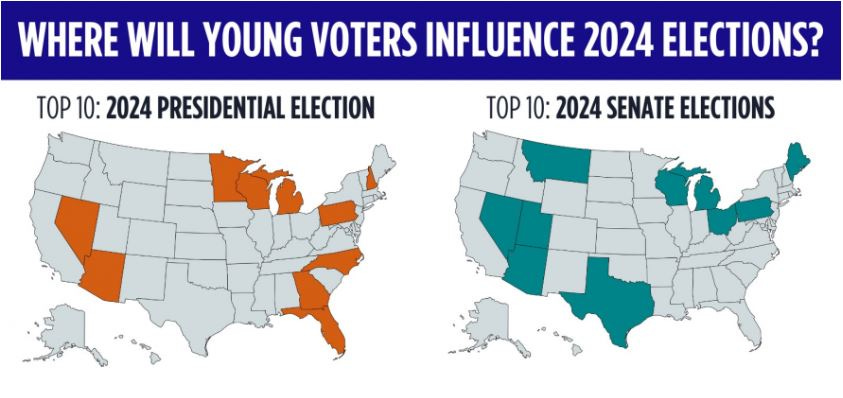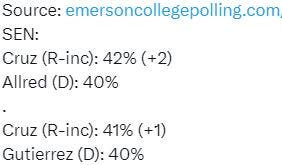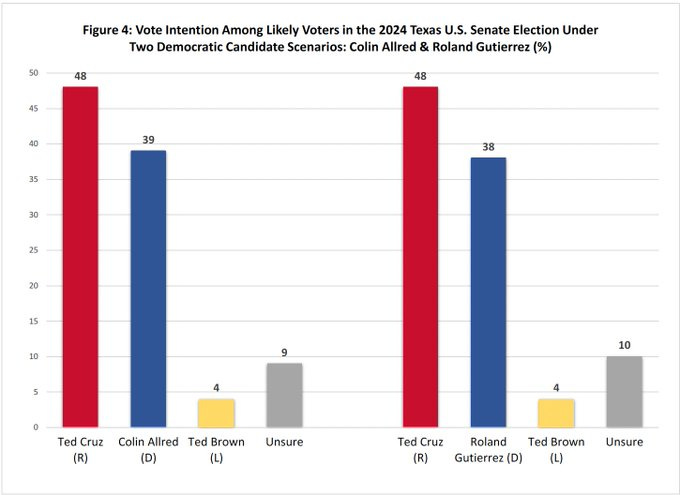Will Texas Democrats Rebel Against The Democratic Establishment In March?
Choosing Sides: The battle between Texas Progressives and the DC Establishment.
Over the last decade, I’ve closely observed Texas politics, where the Democratic Party’s strategy has often been the topic of conversation. Historically, the party’s leaning towards moderates, or what some might call “Republican-lite,” hindered its efforts in voter mobilization. “That’s just your echo chamber talking,” I would tell myself whenever I thought a candidate was too moderate.
However, what was once confined to my echo chamber is gaining broader relevance amid the current intensity of the US Senate Democratic primary race. Then, there’s the recent resolution from the Texas Democratic Party calling for a ceasefire in Gaza. It shows a shift to the left, suggesting a reevaluation of the party’s strategy, aligning them with the grassroots’ growing demand for progressive leadership and policies.
The evolving landscape of Texas politics and growing appetite for progressive change set the stage for a potential shift in the Democratic Party’s direction in 2024. Factors contributing to this shift include the state’s rapidly diversifying population, the rising influence of younger, more progressive voters, and a growing awareness of systemic issues that require policy responses.
These elements suggest that Texas Democrats, as a voting bloc, may reject establishment figures in favor of candidates who embrace more progressive platforms and approaches.
Reasons why we could see Texas Democrats reject the establishment in 2024.
The National Democratic Party has overlooked Texas for the last 20 years and has not invested enough resources in Texas elections. This lack of investment has harmed us in building a Democratic infrastructure that could challenge Republican dominance.
The Democratic establishment has taken Texas for granted, assuming that demographic changes would naturally lead to the state becoming more Democratic without significant effort or targeted strategies to engage and mobilize these communities.
Within the Democratic Party, a faction believes the establishment has not adequately supported progressive candidates and causes in Texas. This includes a perceived reluctance to back candidates who champion progressive policies on healthcare, environmental issues, and social justice, which could energize the base and attract new voters.
The 2020 election highlighted some of these challenges. Despite high expectations and significant investment, Democrats did not achieve the breakthrough in Texas they had hoped for. This result led to criticism of the strategies from the national party, including how resources were allocated and the effectiveness of outreach efforts to key demographic groups.
There’s something that Beto O’Rourke used to say at his rallies that resonated with me, “There will be no cavalry coming in to save us.”
I think about that a lot, and as many of you already know, I’m studying to become a historian focusing on Texas history. Understanding the state’s past is crucial to grappling with its present and future.
The abrupt end of Reconstruction marked the beginning of a long period during which liberals and people of color in Texas felt abandoned by Washington, DC, only to be re-engaged under Lyndon B. Johnson’s presidency with the enactment of the Civil Rights Act and the Voting Rights Act.
However, in recent years, with escalating voter suppression, the rollback of abortion rights, and unchecked Republican corruption, the sense of abandonment has resurfaced. This historical context is vital for comprehending why many Texans feel overlooked by the national political establishment. It’s an old hat for us, and many Texans remain skeptical now that establishment candidates are vowing to fight for us.
What reasons are there to believe that Democratic voters in Texas are moving left?
Younger voters tend to lean more progressive than older voters. They are more likely to prioritize issues like climate change, social justice, and systemic reform in criminal justice and healthcare areas. Older Democrats might prioritize stability, economic growth, and incremental changes to existing systems.
Texas is one of the “youngest” states in the nation: 23% of its residents are under age 30.
Where Democrats live can significantly affect their political views. Urban areas, which often feature greater diversity and higher levels of education, tend to be more progressive. In contrast, Democrats in rural areas might hold more moderate views.
It is currently estimated that 88% of the people of Texas live in urban areas. In comparison, 82% of those living in the United States are urban. Texas is the 15th most urban state in America. This means that Texas Democrats are more likely to hold progressive values, which are values linked to greater tolerance for ethnic, cultural, and sexual diversity and individual choice concerning the kind of life one wants to lead.
Experts call it the urban-rural political divide, and it’s very much applicable to Texas.
Also, income can influence political orientation in complex ways. Lower and middle-income Democrats may support progressive economic policies like increasing the minimum wage, universal healthcare, and wealth redistribution. Conversely, higher-income Democrats might support progressive social policies but be more moderate or conservative on economic issues that affect taxation and regulation.
In Texas, 41% of households have a median income below $50,000. Over 4 million Texans are currently living in poverty.
Additionally, as the Texas Democratic Party has struggled in recent years, grassroots movements within the state have gained momentum. These groups have been pushing for more substantial changes on social justice and economic issues, reflecting a broader desire among Democrats for a shift away from centrist positions.
There is a misconception that Democratic candidates must appeal to Republicans to win in Texas.
The misconception that Democratic candidates must appeal to Republicans to win in Texas stems from traditional conservative views on the state’s political landscape, which has been predominantly Republican for decades. This belief suggests that to secure electoral victories, Democrats need to moderate their positions to attract Republican and independent voters disillusioned with the GOP. However, several factors challenge this notion:
The rapidly changing demographics.
Young voters in Texas are increasingly progressive.
The urbanization of Texas.
Although not all have resulted in victories, closer-than-expected races and wins in traditionally Republican districts have shown that a progressive message can be competitive in Texas.
In 2020, when I began researching and writing about the Confederate statues still littered all over our state, I encountered over a dozen progressive groups in various areas. These groups were not affiliated with the local county Democratic parties, nor did they associate with them. They were all further left.
Then, a few years ago, when I joined the Texas Grassroots Alliance, I learned that hundreds of progressive groups, mostly unaffiliated with the state party, were fighting for social change in almost every county.
Over the years, plenty of research suggests that non-voters are likelier to lean left than right.
What if we’ve consistently seen a low voter turnout in Texas because voters haven’t felt motivated by their choices of Republicans and moderate Democrats? This is a theory, but could we see an increased turnout with a more progressive candidate (one without baggage, like Beto)?
MJ Hager is a perfect example.
The one thing that most Texans agree on is that MJ Hager was a terrible candidate. Her 2020 Senate campaign faced challenges. Her attempt to appeal to moderate Republicans and progressive Democrats did not resonate with either group to mobilize the broad coalition needed for a Democratic victory in Texas.
The Democratic establishment in Washington DC threw its support behind MJ Hegar, putting a significant investment in her campaign despite her lack of popularity among Texas Democratic voters. This decision underscored the national party’s strategy of backing candidates they believed could appeal across party lines, even if it meant sidelining more progressive contenders who might energize the Democratic base more effectively.
The funding and endorsement Hegar received raised questions about the national party’s understanding of Texas’s evolving political landscape and whether such investments were indeed in line with the preferences of the state’s Democratic voters.
After all, we aren’t just Democrats; we’re Texas Democrats, which means something.
Texas Democrats are unlike Democrats in other states.
The demographic composition of Texas Democrats is unique, mainly due to the large Hispanic population. Hispanic voters tend to lean Democratic, but their priorities and political views can be different from those of Democrats in states with fewer Hispanic residents. Immigration, border security, and bilingual education are often more important among Texas Democrats.
While 71% of America is white and non-Hispanic, that number is only 38% in Texas.
Texas’ vast size and geographic diversity mean that Democrats from different parts of the state can have varying priorities. Urban Democrats in cities like Houston, Dallas, and Austin may prioritize issues like public transportation, affordable housing, and progressive social policies. At the same time, rural Democrats might focus more on agricultural policies, rural healthcare, and gun rights.
Texas has a solid cultural identity that emphasizes individualism, which can influence the political leanings of its residents, including Democrats.
The state has seen a rise in progressive activism and grassroots movements, particularly in response to state-level policies on issues like voting rights, abortion, and education. This activism has contributed to a more energized Democratic base, with a focus on mobilizing young and minority voters.
Colin Allred vs. Roland Gutierrez.
The Washinton DC establishment has chosen Colin Allred as this year’s MJ Hager. Texas Monthly published an article a few weeks ago saying that Allred is running the MJ Hager playbook. Hager raised millions of dollars from out-of-state donors but lost the election because she failed to appeal to most Texas Democratic voters.
As of the last filing report, 78% of Colin Allred’s money has come from out of state.
Allred hasn’t been campaigning; he only agreed to one debate of the four he was invited to, and his policy positions align better with the Republican Party than Texas Democrats.
In Texas, we’ve seen large-scale protests with more than 10,000 people at each, in Austin, Houston, Dallas, and San Antonio, of Texans calling for a ceasefire in Gaza. These are not Republicans protesting.
While this happened, the Texas Democratic Party became the first state party to pass a resolution supporting a ceasefire.
And after that, Allred voted against a ceasefire.
Regarding the border, after all of the lies Greg Abbott and other Republicans have told, last month Allred crossed the aisle to vote with Republicans on a resolution full of lies to condemn President Biden for an “open border.”
Allred has shown Texans time and time again that he is willing to use the guise of “bipartisanship” to cross the aisle and vote to enable fascism. And the establishment is pouring millions of dollars into his campaign because they think that’s what Texans want.
On the other hand, Roland Gutierrez is gaining traction in Texas. He’s been out there campaigning, but unfortunately, he hasn’t had millions of dollars poured into his coffers from DC like Allred has.
Both candidates have been getting endorsements, but Gutierrez has been pulling in all of the endorsements from progressive organizations, like Mothers for Democracy, Progress Texas, Dallas and San Antonio Stonewall Democrats, Houston LGBTQ Caucus, University Democrats in Dallas and Austin, and Texas Arab American Democrats. Not to mention Lone Star Left.
The race between Allred and Gutierrez is shaping to be a battle between the DC establishment and Texas progressive voters.
This race is not just about two candidates; it represents the struggle between the established way of doing things and an increasing demand for a more progressive agenda.
As the political winds shift in Texas, the Allred vs. Gutierrez matchup offers a clear choice for voters. On one side, Allred’s campaign, heavily supported by out-of-state funds and aligning more closely with moderate positions, suggests a continuation of a strategy that aims to appeal across the aisle, hoping to capture both moderate Democrats and disaffected Republicans. This approach, while pragmatic, does not fully address the core concerns and values of Texas Democrats eager for change.
On the other side, Roland Gutierrez’s campaign, buoyed by endorsements from progressive organizations and a platform that resonates with the more liberal wing of the party, represents a push towards a more aggressive stance on issues such as social justice, healthcare reform, and immigration.
Gutierrez’s grassroots support reflects a growing sentiment among Texas Democrats that the path to victory lies not in diluting their message but in championing bold policies that directly address the needs and aspirations of their constituents.
This divergence in strategy and vision for the future of Texas is at the heart of what makes the 2024 races so pivotal. The outcome will signal the direction Texas Democrats will take in the coming years, choosing either to maintain a centrist approach in hopes of broader appeal or to fully embrace the progressive momentum building within their ranks.
As this race unfolds, it will be crucial for Texas Democrats to consider not just the immediate electoral implications but the long-term identity of their party. By focusing on the concerns that directly impact Texans’ lives and leveraging the energy of progressive movements, Democrats can build a more robust, inclusive, and energized political force capable of contesting statewide and national races.
In a head-to-head match against Ted Cruz, Allred and Gutierrez have been polling equally.
This shows that, like myself, Texas Democrats will vote for a walnut to replace Ted Cruz. Both Gutierrez and Allred can win against Cruz, and I expect this seat will flip in November.
In March, Texas Democrats will decide. Do they want another centrist pro-establishment Senator representing them in DC? Or do they genuinely wish to progress? This is our moment of truth.
Make sure you vote in the March 5 Democratic Primary Election. (That’s in 32 days from now.)
Important 2024 primary election days:
February 5, 2024: Last Day to Register to Vote.
February 20, 204: First Day of Early Voting.
February 23, 2024: Last Day to Apply for Ballot by Mail.
March 1, 2024: Last Day of Early Voting.
March 5, 2024: Election Day!
LoneStarLeft’s Newsletter is a reader-supported publication. To receive new posts and support my work, consider becoming a free or paid subscriber.







I’m really enjoying following you, Michelle and love your work.
To me, Democrats in Texas need to go straight to the heart of the biggest issue: women’s right to be in charge of their own bodies. Abbott, Paxton, and Patrick are completely out of control and frighteningly evil. Call them on their hypocrisy. They want women and immigrants to die. Job 1 is to stop the Texas GOP head-on. Playing nice is getting us no where. Moderates and progressives in Texas should unite! And, I’m supporting Roland - not Colin.
Thanks!
Angry and Fed Up in Round Rock
Thank you Michelle, you confirmed my instinct. I was a NO from the beginning about Allred. I have been donating to Roland Gutierrez.